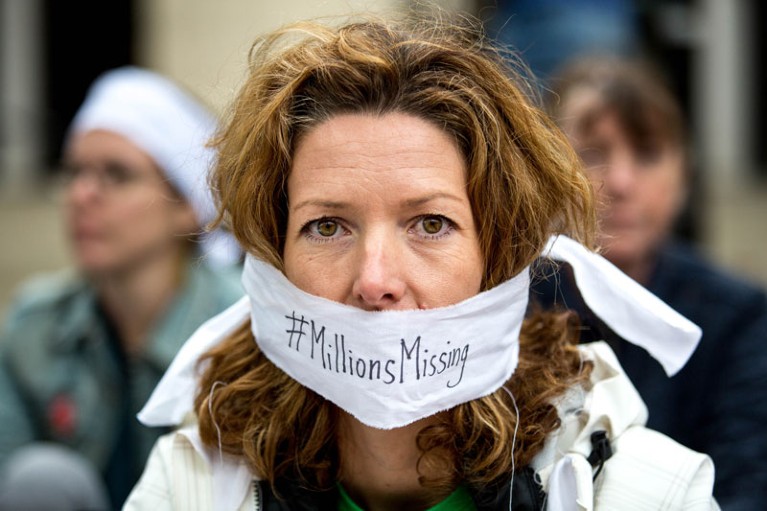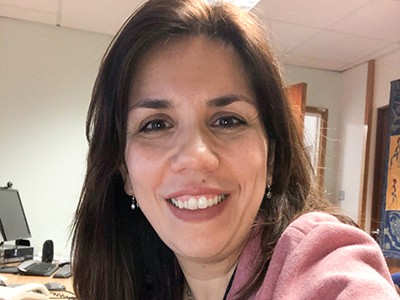
Research funders were reluctant to engage with groups representing people with ME/CFS (pictured). The same mistake must not be made with those experiencing long COVID.Credit: Tom Nicholson/Shutterstock
Breathlessness and fatigue are among the continuing and debilitating symptoms being reported by people with COVID-19 — often months after the onset of the disease, and often long after they have been declared recovered.
Researchers and clinicians have yet to agree on a name for these ongoing symptoms. The literature includes “post-COVID syndrome” and “chronic COVID-19”. Now, researchers, patient groups and those affected by the condition are urging that “long COVID” be used.
They are also calling for the definition of recovery from COVID-19 to be based on criteria that extend beyond just testing negative for COVID. People’s symptoms should be considered, too, such as chest heaviness, breathlessness, muscle pains, palpitations and fatigue, as Nisreen Alwan, a public-health researcher at the University of Southampton, UK, wrote in a World View article in August (N. A. Alwan Nature 584, 170; 2020).
The World Health Organization is following developments on this topic closely. Researchers and funding agencies, too, must give more urgent consideration to the definition of COVID recovery and whether to adopt the long COVID terminology — and they must put the patient voice at the centre of the process.
A negative COVID-19 test does not mean recovery
In deciding how to act on long COVID, researchers and policymakers must take heed of what happened in the case of myalgic encephalomyelitis, also called chronic fatigue syndrome (ME/CFS). The condition shares some of the symptoms of long COVID, and people with ME/CFS struggled for many years to be recognized as having a serious and debilitating medical condition that needed specialized treatment and research.
Around 40 years ago, people began reporting this previously unrecognized disease. Its symptoms included exhaustion, as well as insomnia, and recurring pain. However, in the early years, few of these reports were considered by funding agencies. It took sustained advocacy from patients’ organizations — who had to organize their own independent science advice — to persuade research funders to listen. And although COVID is well known, long COVID isn’t — at least, not yet. It is crucial that those with the condition are listened to in a way that, tragically, people with ME/CFS were not.
The difficulties faced by people with ME/CFS and their representatives resulted, in part, from the fact that the patient voice was marginalized. This contributed to delays in the condition being recognized. Sonya Chowdhury, the chief executive of the UK-based patients’ group Action for M.E., says that even today, ME/CFS is not well studied.
Moreover, the name chronic fatigue syndrome suggested a condition whose primary symptom was tiredness, when people’s experiences are both more painful and more complex. They commonly include recurring pain, which often fluctuates in severity; being unable to sleep; difficulty concentrating; and becoming exhausted after even relatively mild physical activity.
A reboot for chronic fatigue syndrome research
Reaching agreement on the appropriate terminology for long COVID is key, says Felicity Callard, a human geographer at the University of Glasgow,UK, who also has long COVID. Callard and Alwan are among a group of researchers who have experienced long COVID — and who last week wrote a blog post for the British Medical Journal (go.nature.com/2sv47wr), urging the research and medical communities to start using the term long COVID, instead of some of the alternatives. Words such as ‘post’, ‘syndrome’ and ‘chronic’ risk delegitimizing suffering, the authors argue, and that will make it harder for people to access care.
Such terms also carry assumptions about the condition’s underlying physiology that have not yet been properly investigated. Long COVID, by contrast, states clearly that people’s experience of illness after infection is long, but it doesn’t presume to know anything else, Callard says.
It seems the WHO is listening. In August, director-general Tedros Adhanom Ghebreyesus told a meeting of COVID patient groups: “We have received your SOS. We have heard loud and clear that long COVID needs recognition, guidelines, research and ongoing patient input and narratives, to shape the WHO response from here on.”
Public-health authorities, too, are taking note — and some have started to use the term long COVID. Researchers, clinicians and funders must also consider how they will refer to the illness, and how to more accurately define recovery from COVID-19.
And they must always give proper consideration to the voices of people with COVID-19 and their representatives, who have done so much to put long COVID on the health-research and policy agenda.

 A negative COVID-19 test does not mean recovery
A negative COVID-19 test does not mean recovery
 The lasting misery of coronavirus long-haulers
The lasting misery of coronavirus long-haulers
 A reboot for chronic fatigue syndrome research
A reboot for chronic fatigue syndrome research






